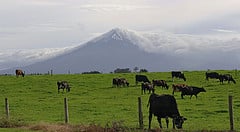
Virginians who try to sell homemade food from their kitchens are feeling the heat from state and local inspectors.
“I have to turn down my neighbors when they ask if they can buy pesto I make from my own basil plants,” says Bernadette Barber, a farmer in Lancaster, Va.
And this isn’t just a rural phenomenon.
In Arlington, government inspectors shut down a home-based soup maker, even though no customer complaints had been registered. Others have encountered similar fates, stripping them of needed income.
Legislation served up for the 2015 General Assembly would turn the tables.
HB 1290, sponsored by Delegate Rob Bell, R-Charlottesville, would end home-kitchen inspections on items produced for direct sale. The goods would bear a label stating that the products are not for resale and were processed without state inspection.
“If someone wants to buy food from someone, what business is that of the state?” asks Matthew French, a farmer in Bland, Va. “The state basically comes at you with a gun, and says you can only buy from state-approved supplier.”
The push for fresh, locally made food is gaining ground,” French told Watchdog.org in an interview. “Buyers want to know the person who’s preparing their food. People want it — and the state is getting in the way,” he said.
The Virginia Food Freedom Act is a follow-up to a Bell-sponsored bill that failed during the 2014 session.
Bell’s original legislation was pilloried by cattlemen, pork growers, the Virginia Farm Bureau and a phalanx of government regulators. Critics claimed that farmers would be hanging cows on front-loaders on the side of the road, French recalls.
“It was ludicrous,” he said.
To address industry and government concerns, Bell’s new bill allows for continued inspection of beef and pork at all venues.
French figures the move will enhance the bill’s prospects for passage. “Politicians are afraid of not getting the Farm Bureau’s support,” he notes.
In the long run, French believes small-scale provisioning has an advantage over industrial-scale agriculture.
“Big business is making a huge mistake getting in bed with government. It doesn’t end well for them,” he said.
Reprinted with author’s permission from Watchdog.org.

